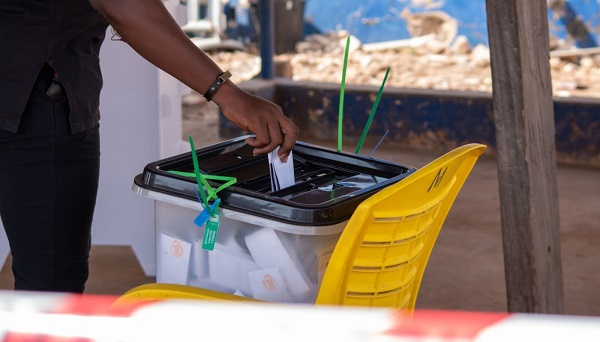Disinterest in voter participation in major electoral processes in Ghana over the years has ignited major concerns and provoked conversations about its damning effects on the nation’s sustained democracy since the beginning of the Fourth Republic in 1992.
Since the year 2000, the percentage of absentee voters at the polls has fluctuated, hitting its lowest during the 2024 general elections, with close to 7.4 million eligible voters (39.1% of registered voters) not turning up to vote.
This occurrence has been described by political actors, experts, and major stakeholders as having the ability to undermine the foundations of democracy in the country, erode the trust of citizens in the political system and the political class, and worsen the already very low sense of patriotism among citizens.
Voter apathy, a phenomenon which refers to reduced interest or enthusiasm among the eligible voter population to participate in elections and related processes, is usually characterized by low voter turnouts and could be attributed to varied causes.
In Ghana, voter apathy is largely ascribed to the gross insensitivity of the political elites to citizens’ plights, unfulfilled promises, corruption, scandals, nepotistic and selfish nature of political leaders, among many reasons. While these factors may be very prevalent, the phenomenon of voter apathy in itself is attitudinal and requires a behavioural change approach to change the trend. The use of social marketing strategies may be very useful.
Social marketing is the non-commercial branch of marketing which relies on the use of commercial marketing strategies to change behaviour for the greater social good. Many international organizations and governments have incorporated social marketing techniques in areas such as blood donation, reducing road carnages, improving sanitation, and curbing epidemics and pandemics, etc.
Reducing voter apathy from the perspective of social marketing will involve applying techniques and strategies typically used in commercial marketing to influence behaviour and attitudes regarding voting. The goal is to increase voter engagement, motivate participation, and foster a sense of civic duty. Here are several strategies that can be effective in this context:
Audience Segmentation:
The preliminary steps involve research to identify the various voter groups and establish insightful knowledge about their behaviour. This paves the way for effective audience segmentation, which aims at breaking the entire voting population into sub-groups according to their unique characteristics. Audience segmentation allows for effective targeting where customized messages are directed to individual groups.
Just as commercial marketers segment their audience to tailor messages effectively, social marketers need to understand different voter demographics (e.g., age, income, education, political affiliation, and geographical location) to craft personalized, relevant messages that resonate with their needs and characteristics.
Clear, Relatable Messaging:
Similar to how commercial marketers simplify complex products, it is crucial for social marketers to make messages to their audience simple and relatable. Messages aimed at fostering participation in electoral processes as one’s civic duty should be clear and focused. They should be devoid of jargon and highlight how voting directly affects the individual’s life.
For instance, emphasizing local election issues or explaining how voting impacts key policies. In attempts to create emotional connections, social marketers may use storytelling, personal narratives, or any relevant and effective communication strategy to show how voting can lead to positive change in society and in one’s life. This may include stories of individuals who were directly affected by political decisions or about how voting brings communities together.
Building Trust and Credibility:
This is achieved when trusted messengers are leveraged. Much like brands partner with influencers, social marketers may use trusted figures such as religious and opinion leaders, chiefs, celebrities, local activists, or even peers to deliver voting messages. People are more likely to be influenced by individuals they trust.
It is important to emphasize the need for transparency and authenticity in the communication process. Establishing trust by being transparent about the voting process, dispelling myths, and offering factual, unbiased information consolidates trust in the system and promotes a sense of patriotism and inclusiveness. Misinformation and mistrust in political systems can deepen apathy, so accurate and clear communication is vital.
Convenience and Accessibility:
Social marketers must actively be involved in ensuring that every stage of the voting process, from voter registration to the announcement of results, is made very easy and accessible. Much as marketers ensure convenience in product or service delivery, making the voting process as simple and accessible as possible is key to encouraging mass participation.
may require major structural, policy, and logistical adjustments that may allow online registration, virtual exhibition of voter registers and voter information verification, early voting, mail-in ballots, electronic voting, etc.
The aim is to reduce logistical and other personal barriers to participation. Providing step-by-step guidance on how to register, where, when, and how to vote can eliminate confusion and increase turnout, especially among first-time voters or those unfamiliar with the process.
Incentives and Rewards:
Rewarding voting behaviour can be an effective motivator. Marketers often use loyalty programs or social rewards to maintain consumer engagement and similar techniques can be used to motivate voter turnout. For instance, social media campaigns that encourage people to post their involvement in the voting process, join online voting events, or participate in social media challenges on registration and voting can provide social rewards.
Encouraging individuals to share their voting plans on social media can create a sense of accountability and positive pressure to participate. When people see others in their social circles voting, they are more likely to vote themselves.
Creating a Sense of Urgency:
Marketers often use the scarcity principle to create urgency, and the same can be applied to voting. Reminding people about election dates, emphasizing deadlines for registration or early voting, and using countdowns can encourage people to act before it’s too late. Also, stressing the impact of voting on key issues (e.g., healthcare, education, the economy) and framing elections as pivotal moments in time can motivate people to participate by making them feel that their vote truly matters.
Social Campaigns and Partnerships:
Similar to cross-branding partnerships in commercial marketing, political campaigns can collaborate with schools, non-profit organizations, or businesses to spread voting messages. These collaborations can help reach different audience segments in ways that resonate with their unique values or interests. Social marketing heavily relies on digital tools, so leveraging social media platforms to reach a broad audience, using targeted ads or viral campaigns, and encouraging users to share voting-related content can amplify the message and reduce apathy.
Long-term Engagement:
Just as marketers aim to build brand loyalty over time, social marketers engaged in promoting positive habits towards voting must work to foster long-term engagement with the democratic process. This can involve continuous civic education, involvement in local issues, and encouraging people to participate in non-election years through community involvement.
Again, reinforcing civic duty by continuously reminding citizens that voting is not just a right but a responsibility can appeal to a sense of duty. Regular civic engagement campaigns that emphasize the long-term importance of participation can help make voting a habit rather than a one-time event.
By adopting these strategies, social marketing can effectively address the root causes of voter apathy, making the act of voting more accessible, engaging, and meaningful to individuals across different communities. It is important to state that although the responsibility to engage citizens in this context legally rests on the shoulders of the National Commission for Civic Education (NCCE), the aforementioned trust and long-lasting relationship must be between the electorates and the state institution mandated to conduct the elections and not the NCCE. The implication is that the Electoral Commission of Ghana must be seen as actively engaged in this process with support from the NCCE and the government in general.
Any other barriers, such as logistical and financial constraints that may hinder smooth implementation, must be envisaged and dealt with for the program to be successful.
Watch a compilation of the latest Twi news below:




